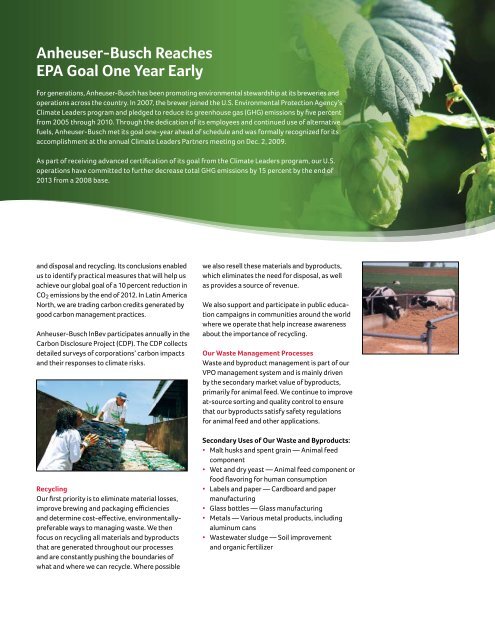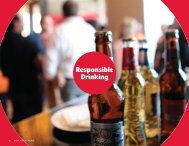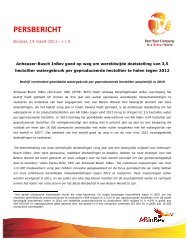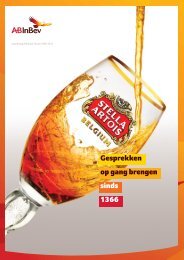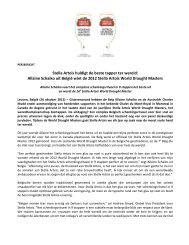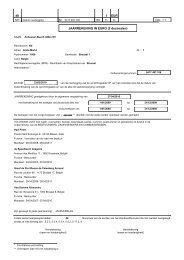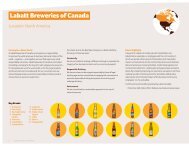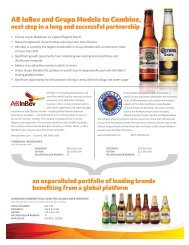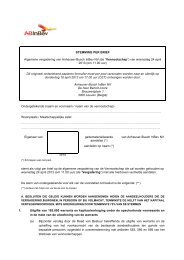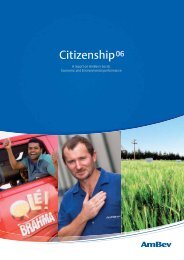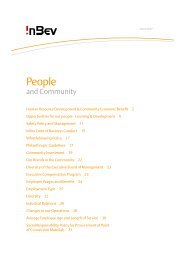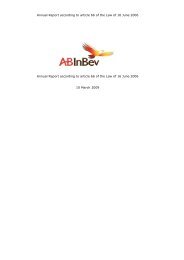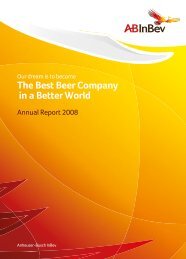Beer & A Better World - Anheuser-Busch InBev
Beer & A Better World - Anheuser-Busch InBev
Beer & A Better World - Anheuser-Busch InBev
You also want an ePaper? Increase the reach of your titles
YUMPU automatically turns print PDFs into web optimized ePapers that Google loves.
18 | Global Citizenship Report 2008-2009<br />
<strong>Anheuser</strong>-<strong>Busch</strong> Reaches<br />
EPA Goal One Year Early<br />
For generations, <strong>Anheuser</strong>-<strong>Busch</strong> has been promoting environmental stewardship at its breweries and<br />
operations across the country. In 2007, the brewer joined the U.S. Environmental Protection Agency’s<br />
Climate Leaders program and pledged to reduce its greenhouse gas (GHG) emissions by five percent<br />
from 2005 through 2010. Through the dedication of its employees and continued use of alternative<br />
fuels, <strong>Anheuser</strong>-<strong>Busch</strong> met its goal one-year ahead of schedule and was formally recognized for its<br />
accomplishment at the annual Climate Leaders Partners meeting on Dec. 2, 2009.<br />
As part of receiving advanced certification of its goal from the Climate Leaders program, our U.S.<br />
operations have committed to further decrease total GHG emissions by 15 percent by the end of<br />
2013 from a 2008 base.<br />
and disposal and recycling. Its conclusions enabled<br />
us to identify practical measures that will help us<br />
achieve our global goal of a 10 percent reduction in<br />
CO2 emissions by the end of 2012. In Latin America<br />
North, we are trading carbon credits generated by<br />
good carbon management practices.<br />
<strong>Anheuser</strong>-<strong>Busch</strong> <strong>InBev</strong> participates annually in the<br />
Carbon Disclosure Project (CDP). The CDP collects<br />
detailed surveys of corporations’ carbon impacts<br />
and their responses to climate risks.<br />
Recycling<br />
Our first priority is to eliminate material losses,<br />
improve brewing and packaging efficiencies<br />
and determine cost-effective, environmentallypreferable<br />
ways to managing waste. We then<br />
focus on recycling all materials and byproducts<br />
that are generated throughout our processes<br />
and are constantly pushing the boundaries of<br />
what and where we can recycle. Where possible<br />
we also resell these materials and byproducts,<br />
which eliminates the need for disposal, as well<br />
as provides a source of revenue.<br />
We also support and participate in public education<br />
campaigns in communities around the world<br />
where we operate that help increase awareness<br />
about the importance of recycling.<br />
Our Waste Management Processes<br />
Waste and byproduct management is part of our<br />
VPO management system and is mainly driven<br />
by the secondary market value of byproducts,<br />
primarily for animal feed. We continue to improve<br />
at-source sorting and quality control to ensure<br />
that our byproducts satisfy safety regulations<br />
for animal feed and other applications.<br />
Secondary Uses of Our Waste and Byproducts:<br />
• Malt husks and spent grain — Animal feed<br />
component<br />
• Wet and dry yeast — Animal feed component or<br />
food flavoring for human consumption<br />
• Labels and paper — Cardboard and paper<br />
manufacturing<br />
• Glass bottles — Glass manufacturing<br />
• Metals — Various metal products, including<br />
aluminum cans<br />
• Wastewater sludge — Soil improvement<br />
and organic fertilizer


